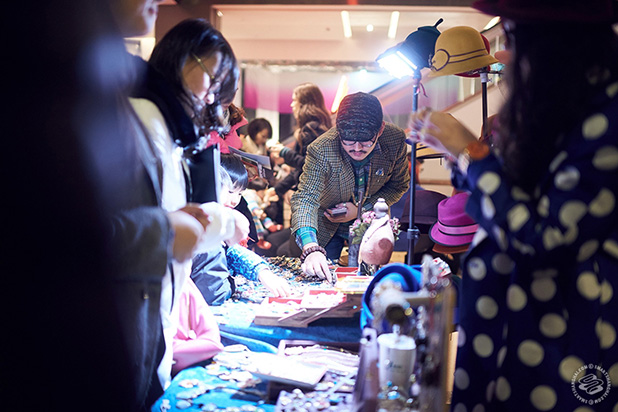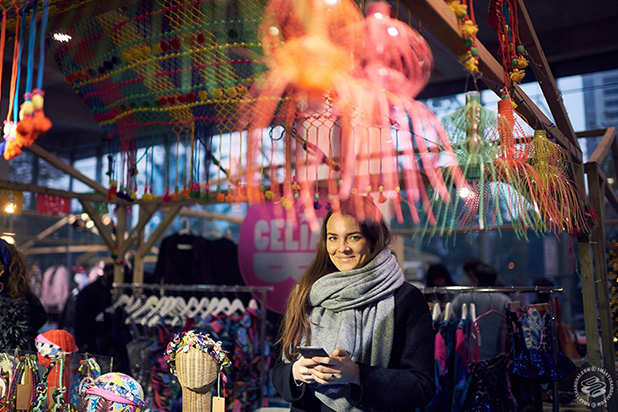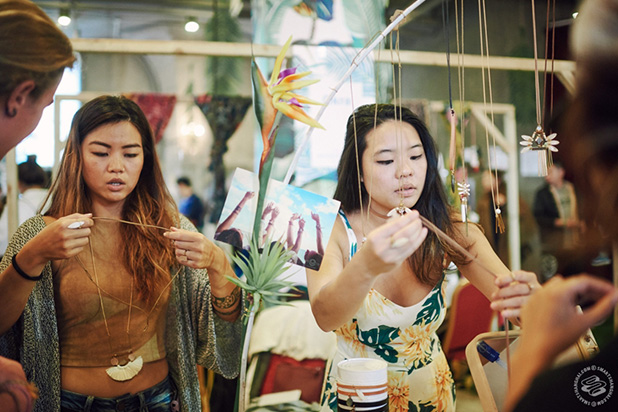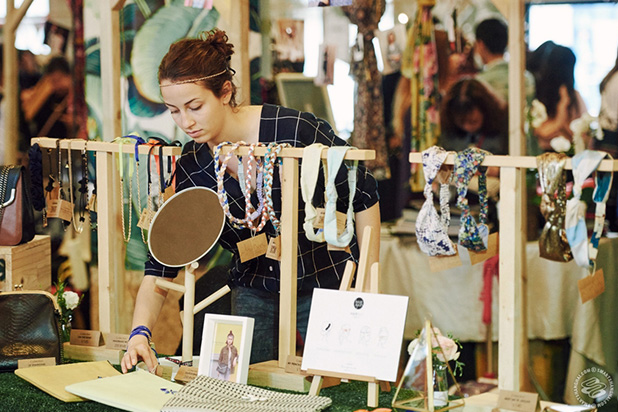We’re entering the busy season for pop-up markets with the weather getting nicer and Shanghairen finally coming out of their apartments, and looking for something fun to do on the weekend days. Yes, you can already smell the not-so-fresh air out there in the city and we might get lucky with a blue sky on the odd Saturday or two down the line. The day market: Shanghai’s favorite alternative to sofa-Sherpas-DVDs.
But who are these vendors, selling their wares at all these pop-up markets? What do they do? How do they do? In the coming weeks, we hope to profile a few of your friendly neighborhood Shanghai market vendors — look for that one regularly on the SmSh Wire — but for today, we’d like to offer up some advice and information on how to get into the market game yourself. Here’re a few things to consider in looking to become a vendor at a Shanghai market.

The Very First Thing You Need
Something to sell. Obviously. Something, anything at all. Well… not anything but… something. Shanghai markets host start-up fashion designers, indie retailers, lifestyle retailers, jewelry vendors, crafts, crafts, and more craftspeople, art and design, boutique foodstuffs and produce — anything from the city’s best waffle to the future priceless masterpiece from China’s next generation of artist superstars — you get the picture.

How It All Works
Yes, it works how you think it works: Independent sellers apply and rent tables or booths from market organizers. Vendors sell product to event guests. Vendors keep money. The end. A few of the markets have slightly different set-ups and it can be a bit different if you are working in F&B and / or taking part in a larger music or beer festival-type event, but that’s basically how it works. A bit more on that below.

What Are the Motivations of Vendors Taking Part in Markets?
In addition to… well, yeah, the money… and the sense of accomplishment and satisfaction one receives when one’s creative and commercial output is embraced by the world, there are several benefits for start-ups to get involved in their local market scene. We recently asked a few of our favorite and most inspiring vendors, brand owners, crafters, and entrepreneurs their reasons for getting involved and they said the following:
-Brand awareness
-Meeting customers, getting closer to their sales base, putting a face on the brand
-Seeing what the local scene looks like and what everyone else is up to
-Testing concepts before launching a proper business
-Expanding creative, commercial, and social networks
-Initiating collaboration projects with like-minded people and businesses
-Getting feedback on products
-Collecting data on what the actual market is like in Shanghai
-Learning about new market trends

A Few Tips Before You Get Jump Right In
Meet the Markets: Get out and go see Shanghai’s markets and pop-ups for yourself. Not all markets and pop-ups are created equal, and not all organizers have the power to turn them into successes. Choose carefully who you get involved with. Think about which market platform is suitable for your product, but also check to see if the organization is on-point for both buyers and sellers. Take promises from organizers with a grain of salt. This is Shanghai after all. It’s easy to make promises; harder to deliver on them. Talk to other vendors to see if they’ve been satisfied working with a given event. Ask them for referrals to other events.
Meet the People: Shanghai is home to a burgeoning scene of craftspeople and start-up food vendors from all over the world. The market scene is one of the most inspiring elements of living in this city, and there’s a nice feeling of community between a lot of the vendors. Make friends. Friends help friends. Friends like to see their other friends be successful.
Maintain Contact: Once you’ve gathered contacts and information, make sure you hang on to it. WeChat is key these days for people to stay connected to the community — through direct contacts, WeChat Groups, and even WeChat Moments to see what’s going on in the city. Always be exchanging WeChat contacts with people you meet, whether they’re event organizers, other vendors, or clientele. One group I’d recommend is “Made in Shanghai” (WeChat ID: MadeinShanghai) — a community that shares information freely to vendors and event organizers, it’s a platform to connect businesses with events and helps with everything from promotions to sales to general advice.

A Bit More on How it Actually Works
Once you find your market, here how it will probably work:
-You will pay a table fee that can be anywhere from 150rmb to 1000rmb depending on the given event. Don’t panic. You have choices and will find the one that matches your budget. (See previous tips!)
-You will usually pay via Wechat, Alipay, or bank transfer well in advance of the event. Even if the last one is still in the forethought of your mind, it’s already time to think about the next one. A lot of the time organizers are pooling their resources together for operations costs for future events. Make sure you are also thinking about the next one. Make sure you’ve got the apps you need to keep the wheels of business turning.
-You will receive information about the execution of the events: time, venue, set up time, rules to respect during the events. Make sure you’re able to adhere to all of that.
-If you are a F&B vendor, make sure you’ve got yourself sorted for the legalities of your operation. Confirm with organizers which sorts of paperwork you need — health certificate and whatnot. That’s… definitely something to consider in light of recent events. *cough cough*
A Few Recommended Market Brands in Shanghai to Watch Out For
Jiatong Market is organized by everyone’s favorite man-about-town, Yannick, founder of The Gastronomy Club. Located in a really charming venue, Jiaotong Market is great for a friendly atmosphere and gourmet bites in a small restaurant villa — an intimate and fun place to hang with two or four-legged friends.
KTGA (Kick the Gong Around), happening only twice a year, is a bigger, more elaborate event that gathers hundreds of brands, and also hosts seminars, workshops, live music, and more. This is always a fun one with a big crowd and great organization. Mark this one in your social calendar to attend even as just a guest if you aren’t looking to get a table. They’re planning a July return. More info at their website.
Common Rare host quality market events and choose their vendors carefully. An arty, more youth-orientated vibe, they offer the crème de la crème of the Shanghai fashion and crafts scene. They just hosted their “Industrial Bloom Fest” a few weekends ago. More information on them from their webpage.
Jiashan Market is probably one of the most famous Shanghai markets, even though it’s still small and friendly. Their main focus is on food products and produce. More info on them right here.
Shanghai Center is organized by Noenne, founder of Shanghai Creatives. This market is in Portman in Jing’an district. SH Center market is quite exclusive and you will need to be referred or see their website to apply.
Made in Shanghai Pop-ups — for their events, they’ve already taken over El Patio, The Cut, The New Factories, and for the next one on May 14 and May 15, the rumor is that they’re taking over Lost Heaven on Julu. (WeChat ID: MadeinShanghai).

One Last Tip?
Don’t give up! Lots of egos and potential drama on all sides of the customer-vendor-organizer relationship, at this intersection of creativity and commerce. But don’t give up and don’t get down if you have a bad event and don’t sell all that much or lose money. You never know, the next time you could sell out completely.
Good luck! Stay connected by actually adding me on Wechat (ID: AdjaLalu). Yup, I am one of your ways in, so be nice.
Kidding la… not.
***
Adja Sy is the founder of Lalu Natural Skincare, appearing at a Shanghai market near you. Look for her bi-weekly column covering the market at crafts scene on the SmSh Wire.

![[How to]: Be a Vendor at a Shanghai Market](https://www.life-china.com/wp-content/uploads/2019/07/1492395970.jpg)
![[How to]: Buy Movie Tickets With WeChat, AliPay, And Gewara](https://www.life-china.com/wp-content/uploads/2019/07/1452157083-440x264.jpg)
![[How To]: Send Money Overseas](https://www.life-china.com/wp-content/uploads/2019/07/1558859524-440x264.jpg)
![[How To]: Soundproof Your Life](https://www.life-china.com/wp-content/uploads/2019/07/1555336018-440x264.jpg)

Recent Comments